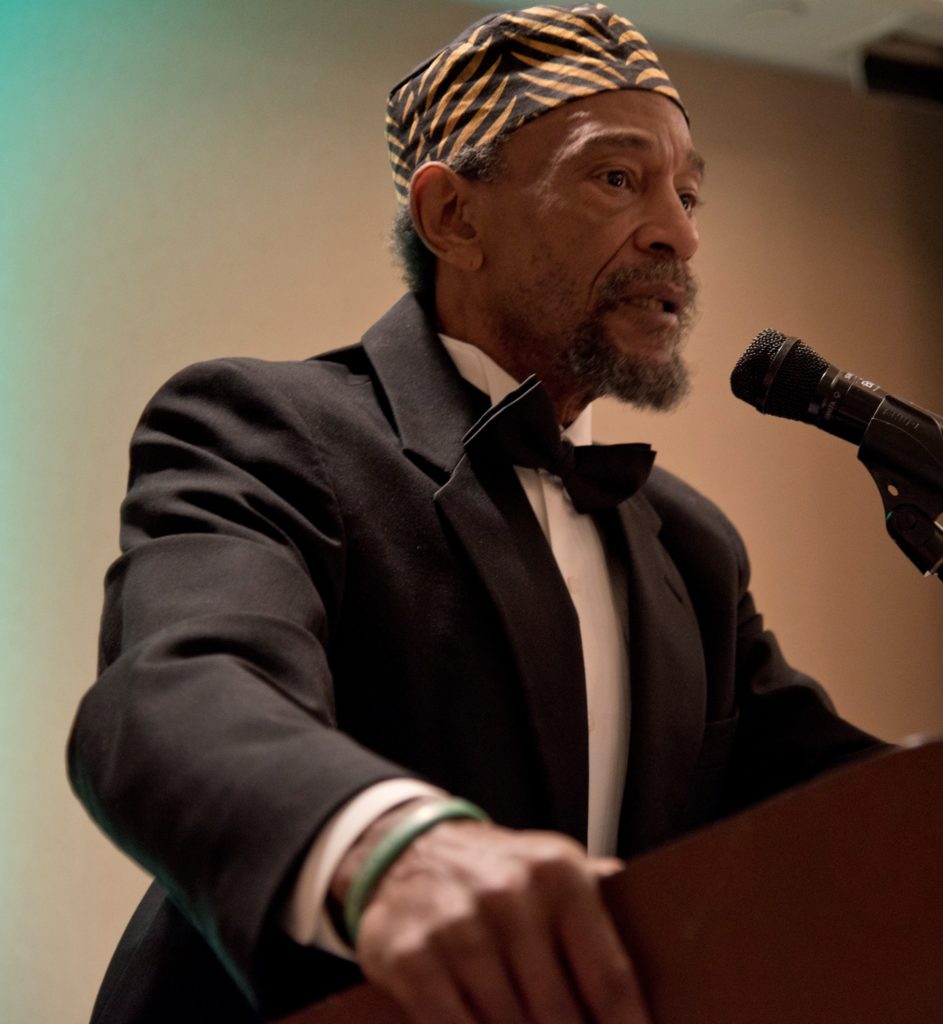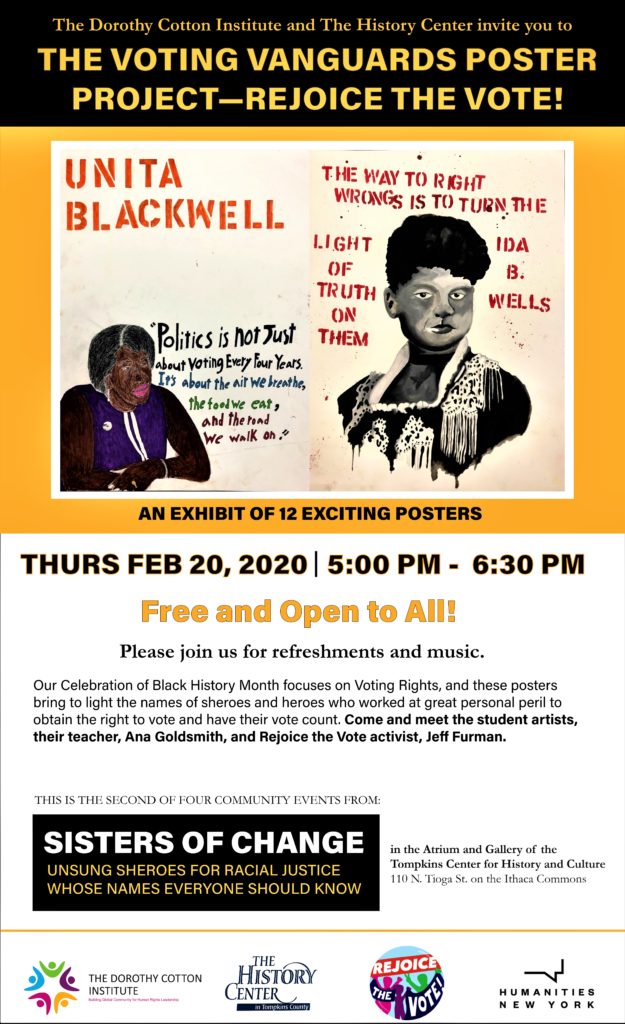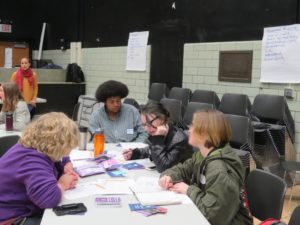Don’t miss the long-awaited East Coast premier of our documentary! It is part of the:
Running Time: 87 min
A featured in-person screening of at Cinemapolis, Saturday, March 25, 7 p.m.
PSP filmmakers Ry Ferro and Deborah C. Hoard, and DCI Project Director Laura Branca will be present for Q & A, along with other special guests.
Ticketed event.
Dorothy Foreman Cotton was a bold and highly effective civil rights leader, who educated thousands in their citizenship rights and inspired generations of activists with her powerful freedom songs and her leadership. SCLC’s Education Director, and the only woman on Dr. Martin Luther King Jr.’s executive staff, Dorothy was a charismatic, courageous and consistently overlooked key player in the Civil Rights Movement.
East Coast Premiere will be on 3/25, and Move when the Spirit Says Move with be at Cinemapolis through April 7, for a 14-day run. Tickets available to the public at Cinemapolis.

Kirby Edmonds, DCI Human Rights Day Gala, Dec. 2018; photo by Kathy Morris
Ithaca – Kirby V. Edmonds, 69, of Ithaca, New York died peacefully on August 22, 2020 in the company of his loving family. He was born on August 17, 1951 in Huntsville, Texas. As a youth he was educated in Glastonbury, Connecticut, Nairobi, Kenya, and Beirut, Lebanon. He held two degrees from Cornell University, a B.A. in History and an M.P.A.
Kirby was a mighty river that flowed through our community and far beyond, watering the positive seeds of possibility. He led in countless ways: as Managing Partner of TFC Associates (Training for Change), as Senior Fellow and Program Coordinator of the Dorothy Cotton Institute (DCI), co-founder of the Building Bridges network, and as lead facilitator in development of the City of Ithaca Comprehensive Plan. He functioned behind the scenes as a coach, mentor, encourager, and backbone in several collective impact initiatives, for example, as Coordinator of the Cradle to Career, as Chair of the Ultimate Reentry Opportunity Advisory Committee and by supporting the Childhood Nutrition Collaborative, community involvement in Ithaca’s Green New Deal, and family engagement in My Brother’s Keeper Ithaca.
Early in his career Kirby set up a drug and alcohol crisis hotline and became a trainer in prevention and treatment systems. He developed a deep understanding of groups, the dynamics of oppression, and the challenge of getting well in an unhealthy society. He worked on the cutting edge of education and training for people in recovery becoming community-based practitioners equipped to lift up and assist others struggling with addiction. A foundation of his practice in whatever action was at hand was to champion people most directly affected by oppression and inequity.
In 1981, Kirby co-founded Training for Change (TFC Associates) to support healthy organization development, collaborative leadership, and to eliminate racism and all forms of oppression. Over a 33-year creative partnership in TFC and later DCI, Kirby Edmonds and Laura Branca built a far-reaching practice and shared mission, true to the taproots of anti-oppression, social justice, human rights, educational equity, cultural competency, and the power of collective endeavor. Kirby was brilliant at interweaving and operationalizing these ideas. Between 2007-2015 Kirby and Laura designed and facilitated the original Multicultural Resource Center’s Talking Circles on Race and Racism. For three decades, Kirby volunteered as a mediator and coach for the Community Dispute Resolution Center. As a Senior Fellow at DCI, he championed a vision of a global human rights movement achieving the full realization of human dignity, justice, and freedom for all.
In 2014 Kirby and a cadre of community leaders attended Tamarack Institute’s Collective Impact (CI) Conference in Toronto and brought back models for achieving big audacious community goals. Right away Building Bridges took up leadership, often without compensation, to get powerful and lasting CI initiatives going. Only days before his death, Kirby was on Zoom calls from his hospital bed, fulfilling his long-term commitment to these and other initiatives as organizer, facilitator, and coordinator.
Kirby was everywhere. Kirby worked with indigenous people in the Northwest Territories and was a co-founder of Human Rights Educators USA (HRE USA). In the 1980s he led anti-oppression workshops for Cornell’s Human Relations Training Program. Kirby was bravely willing to go toward conflict situations, as when he mediated a volatile land use dispute in Ghana for World Vision. He was a close colleague and champion of civil rights leader Dorothy Cotton, co-founding the Dorothy Cotton Institute and doing everything in his power to promote her legacy of non-violent direct action. In 2012 he helped DCI bring a delegation of 23 civil and human rights activists and scholars to Israel-Palestine to meet with Palestinians and their Israeli allies non-violently resisting the Occupation in the West Bank.
Kirby described himself as a community organizer. He was that in practice and through the strategies he used, seeking funds to pay other community-based organizers to engage and empower their neighbors. He was a master network manager, able to weave together many strands of relationship through his persistent willingness to show up with a shared purpose on his mind. Everywhere that people of good will united to tackle problems or cultivate opportunities, Kirby was quickly pulled into the center. He took on many roles– contributor, connector, or designated leader, but always encouraged folks to plan actions that would get more power and resources into the people’s hands. Soft spoken and kind, Kirby was skilled in the art of posing incisive questions, ever asking folks to consider who else should be at the table. He had a keen understanding of power and the courage never to shy away from issues of violence, racism, poverty, hunger, and intergroup conflict.
Kirby was a builder of movements and a peaceful warrior for human rights. He had almost limitless vision, determination, and optimism. He sought and created possibilities for many people, paved avenues for positive change, and drew others in with his quiet, unflappable confidence. He was an exceptional singer-songwriter who had three bands in Ithaca. He loved music, enjoyed dancing, jig-saw puzzles, reading sci-fi, and watching baseball and football games with his son. And in his off hours, he was often painting and renovating houses. He was a valiant leader and a giant in his community.
He is survived by his wife, Judith Scherer and sons, Quincy J. Edmonds, and Ramsey M. Edmonds of Ithaca; his mother, Doris Edmonds, his sister Katree Edmonds, and was pre-deceased by his father, George Freddie Edmonds of Albuquerque, New Mexico. And, by his partner and comrade, Laura Branca of Ithaca.
Information will be shared in the future about a memorial celebration of his life. All who were blessed to know, admire, and love him miss him greatly.
Cards and notes may be sent to the Dorothy Cotton Institute, PO Box 321, Ithaca, NY 14851. In lieu of flowers, donations may be made by check payable to The Center for Transformative Action with “DCI” in the memo line, and mailed to Dorothy Cotton Institute PO Box 321, Ithaca, NY 14851
or you may donate online at https://www.givegab.com/donations/new?group_id=dorothy-cotton-institute

–See the Sisters of Change exhibit in the Atrium Tower, and The Voting Vanguards show in the Gallery
–Meet the student artists, their teacher, Ms. Ana Goldsmith, and Rejoice the Vote! activist, Jeff Furman
–Hear about the Voting Vanguards–the American sheroes and heroes who fought for our voting rights
–Hear about the Constitutional Amendments and Voting Rights Act: the foundation for our voting rights.
–Register to Vote on the spot if you haven’t already!
–Share your own answers: Why do you vote? Why will you vote? Why do you want your family to vote?
–Free & Open to all, especially students, educators and families.
–Enjoy refreshments and Ben & Jerry’s Ice Cream!
As the new Poor People’s Campaign is gathering momentum and organizing across the country, locally and regionally, people are grounding themselves in understanding what, on April 4, 1967, MLK Jr. called the three evils of racism, poverty and militarism in his extraordinary and groundbreaking speech at Riverside Church in NYC, Beyond Vietnam–A Time to Break the Silence in which he took a courageous moral stand against the war in Vietnam,
Dr. King began to explore a new kind of revolution, a vision of people at the grassroots/community level creating new values, relationships, and structures as the foundation for a new society and combining the struggle against systemic racism with a struggle against poverty and militarism.
“We have left the realm of constitutional rights and we are entering the area of human rights.” …. “The Constitution assured the right to vote, but there is no such assurance of the rights to adequate housing, or the right to an adequate income … It is morally right to insist that every person have a decent house, and adequate education and enough money to provide basic necessities for one’s family.”
In 1968 the Poor People’s Campaign set up a multiracial, multi-ethnic Resurrection City on the Washington Mall and demanded an economic bill of rights.
Today the new Poor People’s Campaign is bringing together Americans who have a lot more in common than we are often led to believe about each other. Building coalitions and solidarity is not easy. As we remember the tragedy of his assassination fifty years ago, we can also look deeply at the legacy of Dr. King’s remarkable role in the Freedom Movement, the power of non-violent direct action, and his ability to see the interlocking web of all forms of discrimination, violence, oppression, and war. To these we add the fundamental need for a healthy planet and an end to environmental degradation. We can look at the good news of the massive amount of effective organizing happening all over the country now to end the many forms of interpersonal, cultural and state-sponsored violence, and the reverse the daily dismantling of the basic public protections of people’s civil, political, economic, cultural and social rights. Something powerful is happening here.
On March 13, the Dorothy Cotton Institute presented an interactive half-day training workshop on understanding the human rights framework, for students from two high schools–Lehman Alternative Community School, and New Roots Charter School. The half-day workshop was hosted by LACS in their terrific theater space. DCI Senior Fellows Kirby Edmonds and Laura Branca designed and led the training.
A highly committed team of educators who are champions for equity and inclusion in their schools worked together to organize, find a time and space, and encourage their students to attend.
 Many of the youth who attended the workshop are already involved working for justice and positive change in their schools and in their lives. The purpose of this workshop was to encourage them to use their understanding of human rights for creative self-expression, scholarship, and positive action to end discrimination and respect human dignity. The DCI is invited some youth to design a panel at The History Center about their work for social justice, date TBD.
Many of the youth who attended the workshop are already involved working for justice and positive change in their schools and in their lives. The purpose of this workshop was to encourage them to use their understanding of human rights for creative self-expression, scholarship, and positive action to end discrimination and respect human dignity. The DCI is invited some youth to design a panel at The History Center about their work for social justice, date TBD.
Human Rights are Universal, which means that they belong to all people, everywhere. Yet it’s surprising how many people do not know very much about array of rights and responsibilities that our nation and hundreds of other nation states across the globe have made a commitment to protect and uphold.
The Right to Know Our Rights: The Declaration of Human Rights Education and Training says that first and foremost is our right to know our rights, and that all people, everywhere, are entitled to human rights education. The Dorothy Cotton Institute is very pleased to offer young people the opportunity to examine their experience through the lens of human rights and responsibilities.
If you are interested in future human rights workshops for young people, educators or activists, please contact Kirby Edmonds at tfckirby@aol.com, or 607-277-3401.